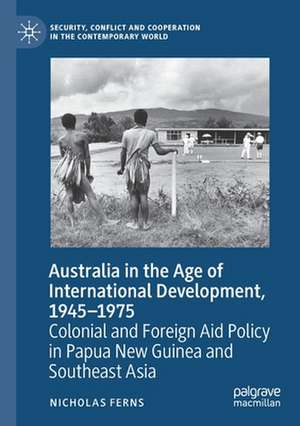Australia in the Age of International Development, 1945–1975: Colonial and Foreign Aid Policy in Papua New Guinea and Southeast Asia: Security, Conflict and Cooperation in the Contemporary World
Autor Nicholas Fernsen Limba Engleză Paperback – 20 iul 2021
| Toate formatele și edițiile | Preț | Express |
|---|---|---|
| Paperback (1) | 384.09 lei 6-8 săpt. | |
| Springer International Publishing – 20 iul 2021 | 384.09 lei 6-8 săpt. | |
| Hardback (1) | 389.11 lei 6-8 săpt. | |
| Springer International Publishing – 19 iul 2020 | 389.11 lei 6-8 săpt. |
Din seria Security, Conflict and Cooperation in the Contemporary World
- 9%
 Preț: 765.10 lei
Preț: 765.10 lei - 20%
 Preț: 689.80 lei
Preț: 689.80 lei - 20%
 Preț: 565.89 lei
Preț: 565.89 lei - 20%
 Preț: 629.10 lei
Preț: 629.10 lei - 18%
 Preț: 785.42 lei
Preț: 785.42 lei - 18%
 Preț: 775.15 lei
Preț: 775.15 lei -
 Preț: 386.61 lei
Preț: 386.61 lei - 15%
 Preț: 584.43 lei
Preț: 584.43 lei - 15%
 Preț: 693.25 lei
Preț: 693.25 lei - 15%
 Preț: 527.97 lei
Preț: 527.97 lei - 15%
 Preț: 638.25 lei
Preț: 638.25 lei -
 Preț: 384.86 lei
Preț: 384.86 lei -
 Preț: 481.43 lei
Preț: 481.43 lei -
 Preț: 383.12 lei
Preț: 383.12 lei -
 Preț: 391.61 lei
Preț: 391.61 lei - 15%
 Preț: 638.76 lei
Preț: 638.76 lei - 18%
 Preț: 778.45 lei
Preț: 778.45 lei - 15%
 Preț: 639.37 lei
Preț: 639.37 lei -
 Preț: 390.63 lei
Preț: 390.63 lei -
 Preț: 385.84 lei
Preț: 385.84 lei - 15%
 Preț: 471.69 lei
Preț: 471.69 lei - 15%
 Preț: 586.55 lei
Preț: 586.55 lei -
 Preț: 385.25 lei
Preț: 385.25 lei -
 Preț: 383.33 lei
Preț: 383.33 lei - 18%
 Preț: 731.10 lei
Preț: 731.10 lei - 18%
 Preț: 891.80 lei
Preț: 891.80 lei - 15%
 Preț: 699.77 lei
Preț: 699.77 lei - 15%
 Preț: 703.20 lei
Preț: 703.20 lei - 15%
 Preț: 588.18 lei
Preț: 588.18 lei -
 Preț: 386.81 lei
Preț: 386.81 lei - 18%
 Preț: 786.36 lei
Preț: 786.36 lei - 15%
 Preț: 638.57 lei
Preț: 638.57 lei -
 Preț: 380.63 lei
Preț: 380.63 lei -
 Preț: 390.63 lei
Preț: 390.63 lei
Preț: 384.09 lei
Nou
Puncte Express: 576
Preț estimativ în valută:
73.51€ • 76.46$ • 60.68£
73.51€ • 76.46$ • 60.68£
Carte tipărită la comandă
Livrare economică 15-29 aprilie
Preluare comenzi: 021 569.72.76
Specificații
ISBN-13: 9783030502300
ISBN-10: 3030502309
Pagini: 231
Ilustrații: XII, 231 p. 1 illus.
Dimensiuni: 148 x 210 mm
Greutate: 0.32 kg
Ediția:1st ed. 2020
Editura: Springer International Publishing
Colecția Palgrave Macmillan
Seria Security, Conflict and Cooperation in the Contemporary World
Locul publicării:Cham, Switzerland
ISBN-10: 3030502309
Pagini: 231
Ilustrații: XII, 231 p. 1 illus.
Dimensiuni: 148 x 210 mm
Greutate: 0.32 kg
Ediția:1st ed. 2020
Editura: Springer International Publishing
Colecția Palgrave Macmillan
Seria Security, Conflict and Cooperation in the Contemporary World
Locul publicării:Cham, Switzerland
Cuprins
Introduction.- 1. “Stone Age to the Twentieth Century”: Trusteeship and the New Deal for Papua New Guinea, 1945-1949.- 2. “By Every Means in Our Power”: The Establishment of the Colombo Plan, 1949-1957.- 3. “New Codes and a New Order”: Papua New Guinean Development in the Hasluck Era, 1951-63.- 4. “Developed, Developing, or Midway?” Australia at the United Nations Conference on Trade and Development, 1964.- 5. “We Should Be Doing More Than We Are”: The Colombo Plan, Papua New Guinea, and the Australian External Aid Review, 1957-1965.- 6. Taking up the “Latest Fashions”: International Development in Flux and the Australian Response, 1965-1975.- Conclusion.
Recenzii
“Ferns’ book … presents an insightful and thoroughly documented assessment of this important topic. … he examines how Australian policy over these years was both consistent and flexible as politicians, bureaucrats, and academics responded and adapted to changing international conditions and intellectual trends. … Ferns’ familiarity with the literature of development, economics, and international relations is strongly evident throughout his book and provides his analysis with a solid knowledge base. … Ferns’ book is nonetheless a timely and necessary contribution to our understanding of Australian political history.” (Jonathan Ritchie, History Australia, August 16, 2021)
Notă biografică
Nicholas Ferns is a Teaching and Research Associate at Monash University, Australia. His research has been published in Australian and international journals, including The Australian Journal of Politics and History and Diplomacy and Statecraft.
Caracteristici
Argues that developmental imperatives were emphasized in Australian aid policy between 1945 and 1975 Provides new insights into the connections between colonial policy in Papua New Guinea and foreign aid in Southeast Asia Shows how Australian policymakers were brought into the global project of international development that peaked during decolonization and the Cold War
